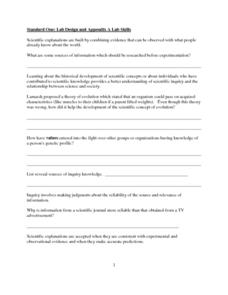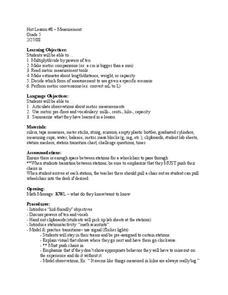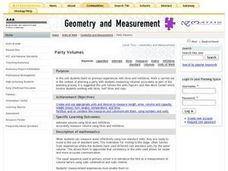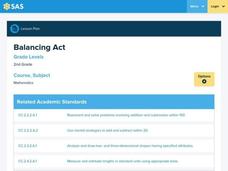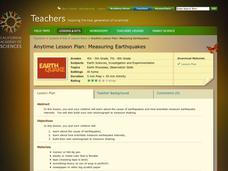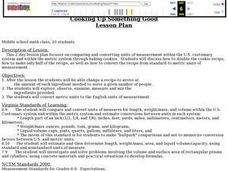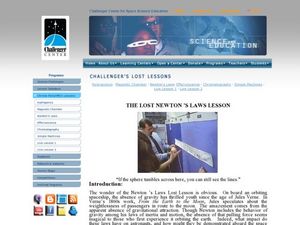Curated OER
Slosh, Dribble, and Plop
Students recognize the need for a standard unit of volume. They estimate and measure to the nearest liter. Also they relate the liter to the familiar everyday containers.
Curated OER
Spaced Out
The students are able to use a formula to calculate the volume of cuboids by measuring the length of each of the three dimensions. They also investigate the relationship between milliliters and cubic centimeters.
Curated OER
Standard One: Lab Design and Appendix A Lab Skills
In this lab design and lab skills worksheet, students answer questions about experimental design including finding variables, determining controls, and graphing data. They answer questions about microscopy and label the parts of a...
Curated OER
IS MASS THE SAME AS WEIGHT?
Students see the difference between weight and mass when they examine the method of measuring each of them.
Curated OER
Shake, Rattle and Erode
Students measure how much mass is worn away during 15-20 minutes of shaking. They shake rocks for 15-20 minutes to simulate stream erosion. Students listen to music as they shake their rocks. They weigh out 100 grams of marble chips....
Curated OER
How Do Your Students Measure Up?
Students participate in a paper folding activity that has them create a ruler for measuring to the closest 1/16th of an inch.
Curated OER
Measurement
Fifth graders complete measurement problems where they use powers of ten, read metric measurement tools, estimate measurements, and more. In this measurement lesson plan, 5th graders complete 10 problems.
Curated OER
Party Volumes: Measurement
Second graders explore liters and milliliters. They estimate volume and accurately measure the volume. Students plan a party and measure volume using liters and milliliters as part of the planning process.
Curated OER
Balancing Act
Second graders identify the attributes of various shapes and estimate the weight of the objects. In this geometry lesson, 2nd graders identify the attributes of concrete objects and use a pan balance to weight them.
Curated OER
Estimation Challenge
Students calculate the length of the classroom using non-standard units of measurement and estimation. Using a cracker box, they discuss measuring various objects in the room as a class, and independently estimate and measure the length...
Curated OER
Water Cycle Stories
Students explore the water cycle and associated phase changes. They predict what happens to the mass of an ice cube in a Ziploc bag, discuss and act out phase changes and diagram the water cycle.
Curated OER
Are You My Little Peanut?
Fourth graders explore the mass and length of peanuts by pretending to parent a peanut. In this mode, median and range lesson students graph their measurements and then use them to find the mode, median and range. Students discuss peanut...
California Academy of Science
Measuring Earthquakes
After a brief discussion on earthquakes, make a makeshift seismograph to record the shaking of the table that it sits upon. While the background information will be useful to you as a teacher, the seismograph does not seem like it would...
Curated OER
Cooking Up Something Good
Students compare and convert units of measurement within the United States customary system and within the metric system by baking cookies. Students discuss how to double the cookie recipe, how to make only half of the recipe, and how to...
Curated OER
Too Heavy For Me
Students explore the different arrangement of air molecules in high and low air pressure masses. They compare the temperature of high and low pressure masses and discover how a barometer works.
Curated OER
Oranges and Stopwatches
Students measure various attributes of an orange. They discuss the attributes of an orange that can be measured, develop a list of attributes and describe how they can measure it, and rotate through four stations measuring the volume,...
Curated OER
Forces and Graphing
Learners analyze graphs to determine relationships between variables and rates of change. They determine the basic concepts about static reaction forces. They determine the slope and equation of a line.
Curated OER
The Lost Newton's Laws Lesson
Students explore momentum. In this physics lesson, students perform an experiment in which two balls are released on slanted boards while students observe which ball will go the farthest and the fastest. Students define and explain...
Curated OER
Tools of the Trade
Third graders explore and identify the tools that can be used to measure length, mass/weight, and volume. They discuss how things are measured using different units, and observe the difference between the English and the Metric systems....
Curated OER
Nature of Game Balls
Fourth graders see how, when balls are dropped from the same height, mass and size affects the motion of the balls.
Curated OER
Weightlessness
Eighth graders study weight, force and mass as it pertains to the earths pull. In this weightlessness lesson students are divided into groups and complete an activity.
Consortium for Ocean Science Exploration and Engagement (COSEE)
Ocean Acidification: Whats and Hows
Open this lesson by demonstrating the production of acidic carbon dioxide gas by activated yeast. Emerging ecologists then experiment with seashells to discover the effect of ocean acidification on shelled marine organisms. They measure...
Michigan State University
Gases Matter
Young scientists learn that seeing isn't necessarily believing when it comes to the states of matter. After performing a fun class demonstration that models the difference between solids, liquids, and gases, children complete a series of...
Curated OER
Intrinsic Viscosity
Students treat a high molecular weight polyvinyl alcohol polymer with potassium periodate. They measure the viscosity of polyvinyl alcohols.


